Store shelves are littered with additives for fuel and engine cleaning additives that claim to increase fuel economy, smooth engine operation, reduce emissions, extend engine life, maximize horsepower and more. Do fuel additives work, and does fuel injector cleaner work? We’ll take a look in this post.
Do Fuel Additives Work?
A quick internet search reveals multiple articles that claim they don’t. There must be a good reason so many people regard fuel additives with skepticism.
While most motorists expect to see the benefits promised by fuel additives immediately, it takes several tanks of treated fuel before most additives provide any noticeable performance improvement.
Having to use a fuel additive for several tanks of fuel doesn’t bode well in a society used to getting what it wants, when it wants it.
Engine Condition Affects Whether Fuel Additives Work
Here’s what often happens.
Over time, performance-robbing deposits form on your engine’s fuel injectors, valves and in the combustion chamber. Today’s injectors are highly engineered to tight tolerances, and even minute deposits interfere with the spray pattern and reduce power and fuel economy.
The problem is especially pronounced in high-pressure common-rail (HPCR) diesel engines and in direct-injection engines that locate the injectors in the combustion chamber exposed to intense heat.
Eventually, you notice a reduction in power, throttle response, fuel economy or drivability. You pick up a fuel additive at the gas station or parts store.
“Increases Fuel Economy!” it proclaims. “Outstanding,” you think as you empty the bottle into your fuel tank.
But, by the time you pull up your driveway, nothing has changed. Or again the next day after you arrive at work. “Do these fuel additives even work?” you ask yourself.
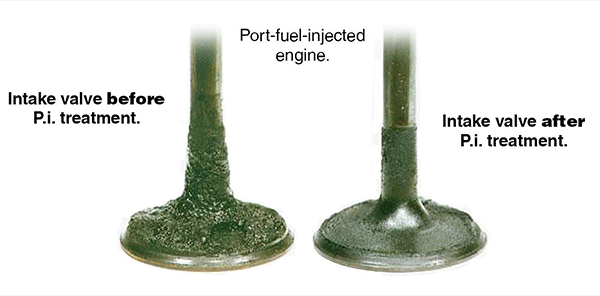
Does Fuel Injector Cleaner Work?
What went wrong when it seems your fuel injector cleaner didn’t work?
Technically, nothing. You likely bought an inexpensive fuel injector cleaner that contains minimal cleaning agents. If you continue to buy the additive and use it with every tank of fuel, maybe over time – could be weeks to months – you may experience a slight up-tick in power, fuel economy or drivability.
Then you can continue to use the additive to maintain engine performance. The fuel injector cleaner did, indeed, work and it did live up to its performance claims. It just didn’t do it quickly or dramatically enough.
Best Fuel Injector Cleaner
It takes a fuel injector cleaner formulated to the correct concentration to deliver immediate results. But most additives for fuel simply don’t contain a sufficient concentration of cleaning agents to provide immediate results.
That’s where AMSOIL is different.
AMSOIL P.i.® Performance Improver is a potent, deep-cleaning gasoline fuel injector cleaner featuring concentrated detergents that aggressively clean stubborn, power-robbing deposits from injectors, valves and combustion chambers. It reduces emissions and increases fuel economy up to 5.7%.¹
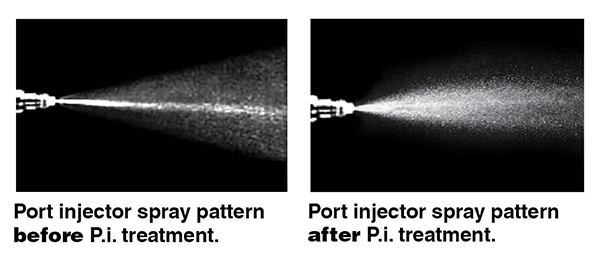
AMSOIL P.i. Also Works In GDI Engines
What’s the best fuel injector cleaner for gasoline direct-injection (GDI) engines?
In GDI engines, injectors are located inside the intense heat-and-pressure environment of the combustion chamber, making them particularly vulnerable to deposits. Extreme pressure combined with incomplete fuel combustion can lead to dramatically increased soot (particulate matter) levels.
Direct injection typically creates 30 to 40 times more soot than port fuel injectors (PFI). Even a minimal amount of injector fouling can lead to increased pollution and wear and decreased power and fuel economy.
AMSOIL P.i. is one of the best fuel additives and best fuel injector cleaners available. It removes stubborn deposits and keeps injectors functioning as they should. Testing shows P.i. restored GDI fuel injectors to a 100% flow rate after one tank of fuel.²
Rather than spend money on expensive fuel injector cleaning methods, try AMSOIL P.i. first as a relatively low-cost, highly effective option.
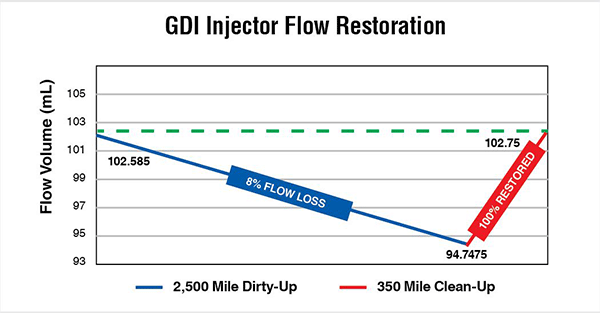
How About Upper-Cylinder Lubricants?
Many additives for fuel are marketed as upper-cylinder lubricants. The intense heat of combustion and limitations of the oil-control piston ring result in a lack of oil at the top of each cylinder. This can lead to ring and cylinder wear that reduces engine compression, decreasing power and performance.
Again, though, some additives don’t provide much, if any, lubricity improvement, as the chart shows. AMSOIL Upper Cylinder Lubricant, however, delivers 18% more lubricity than Lucas³ and 20% more than Sea Foam³ for better retention of horsepower and fuel economy. It also fights ethanol-related corrosion. Check out the video below for more.
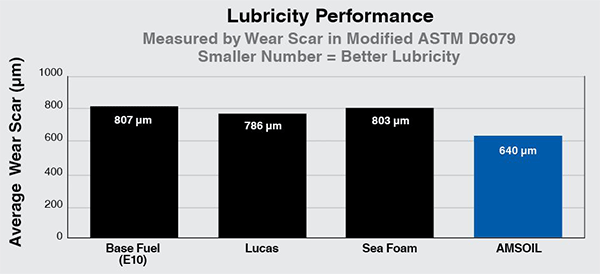
Don’t Forget the Diesel Fuel Additives
For peak performance, diesel engines need a daily dose of detergent for cleaning and lubricity to protect the injectors and fuel pump while keeping the combustion chamber clean.
- AMSOIL Diesel Injector Clean provides the optimum chemistry to deliver confidence your truck is protected.
- AMSOIL Diesel Cold Flow enhances fuel flow and helps prevent fuel-filter plugging in cold temperatures.
- AMSOIL Diesel Cetane Boost raises the cetane number of diesel fuel up to eight points for maximum horsepower, increased fuel economy and easier starts in all diesel engines.
- AMSOIL Diesel Injector Clean + Cetane Boost combines the superior detergency and improved lubricity of AMSOIL Diesel Injector Clean and the increased horsepower and cetane of AMSOIL Cetane Boost in one convenient package.
- AMSOIL Diesel 4-in-1 combines the benefits of all three additives in one convenient package. (It also does a great job preventing fuel gelling in cold weather.)
And don’t forget AMSOIL Quickshot® for your small engines and powersports equipment. It cleans performance-robbing deposits, stabilizes fuel during short-term storage and fights ethanol problems.
So, do fuel additives work? And does fuel injector cleaner work? Yes, if you use the right ones.
¹Based on independent testing using EPA tests: Federal Test Procedure 75 (FTP), Supplemental Federal Test Procedure (US06), and the Highway Fuel Economy Test (HFET). Average fuel mileage increase of 2.3 percent.
²ASTM D5598(M) – 2013 Buick Regal test vehicle
³Based on independent testing of AMSOIL Upper Cylinder Lubricant, Lucas Upper Cylinder Lubricant and Sea Foam Motor Treatment obtained on 02/13/2019 using the ASTM D6079 modified for use with gasoline.
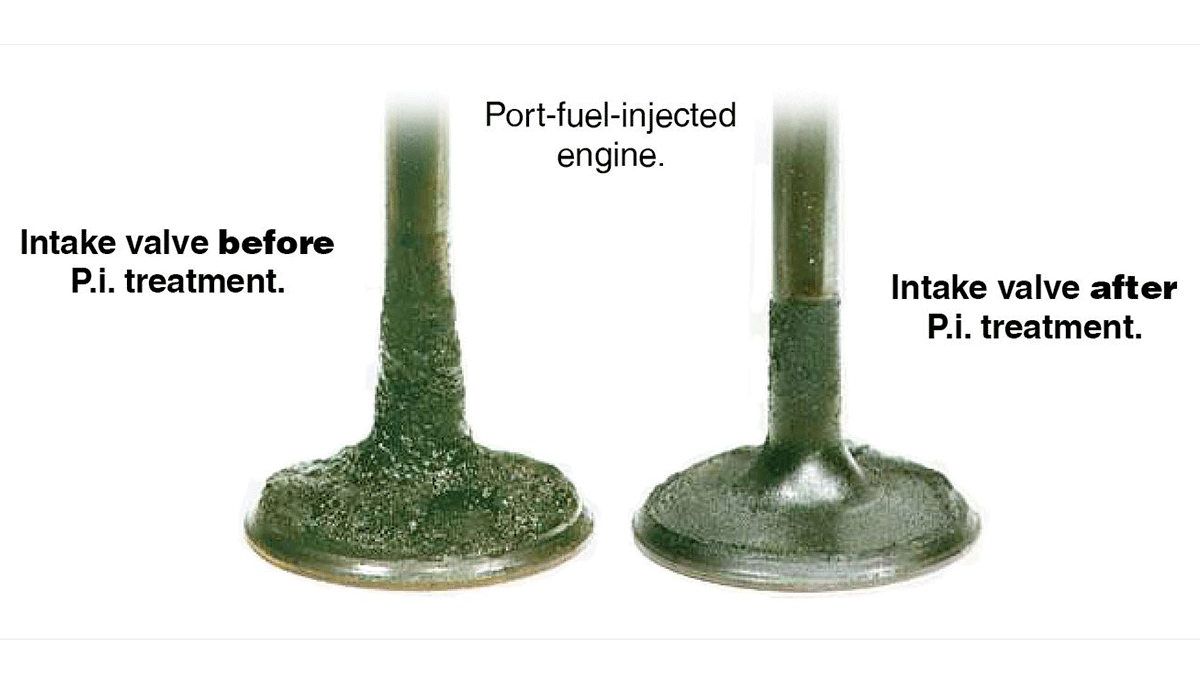

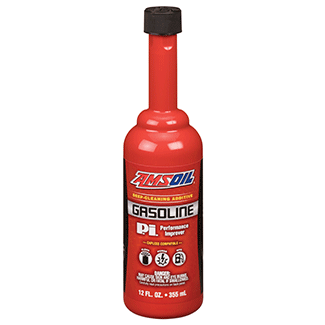
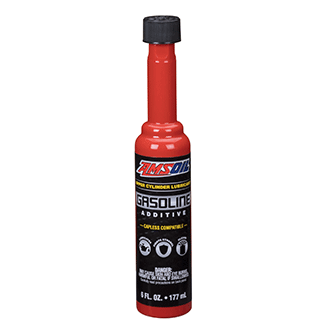
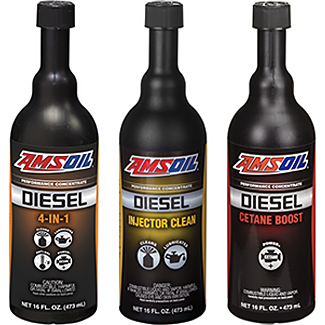

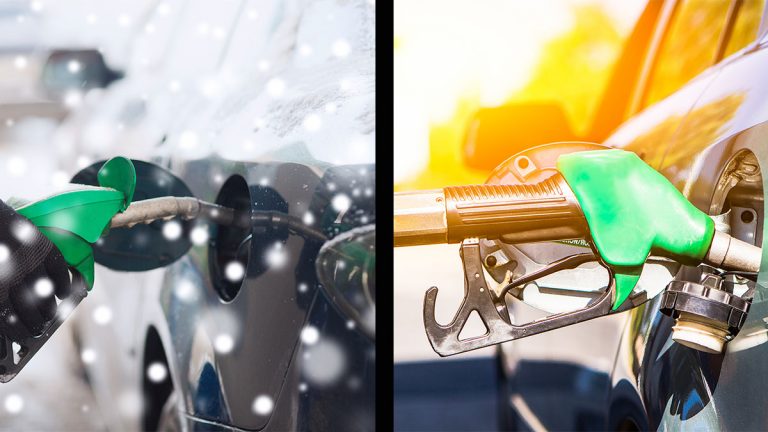


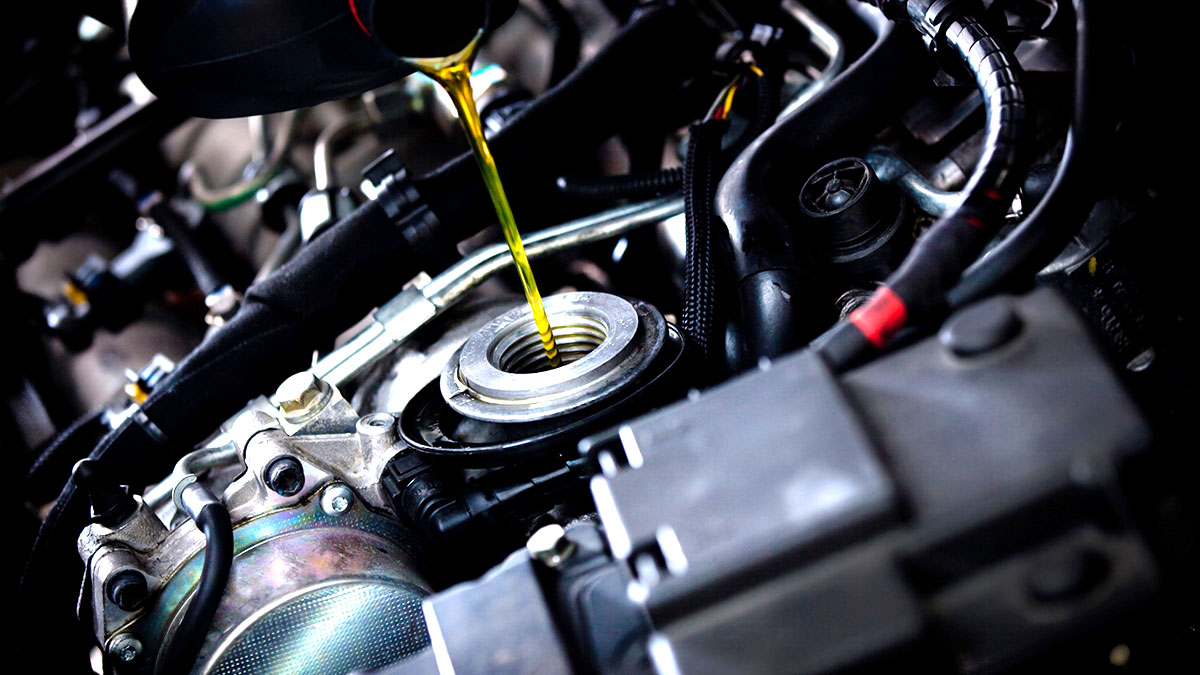
Brilliant Post! Completely agree that you need to know what you want before getting into buying an additive, it can really get confusing quite quickly!
I’ve spoken with so many people who purchase fuel additives, and wonder why they don’t work. Then I ask them what brand they use, and where they get it from. They say they get it from the dollar store. I tell them I’m sorry, but the additives they sell at the dollar store just won’t cut it, unfortunately.
This means nothing for modern direct injection vehicles.
Hi Nick,
True, fuel additives won’t clean the back of the intake valves in a GDI engine, but they still clean the fuel injectors and combustion chamber, which helps improve fuel economy. Check out our white paper on AMSOIL P.i.. Scroll to page 7 and you’ll see the results of testing performed on a VW Jetta GDI. AMSOIL P.i. improved fuel flow an average of 2.3%.
Thanks for reading.
Add a pint of automatic transmission fluid to each tank of gas – worked like a damn on the farm. Kept spark plugs and injectors clean
i would not think ur catalytic converter would like having all that OIL passing thru it… a friend had a car that used a “little” oil, not amsoil, it eventually plugged up, car could not be driven anymore… engine idled, but could NOT reach 20 mph… also i had a car that had 3 bad valve seals, as it turned out, used VERY little oil, way back in ’79… was brand new, & it fouled out the plugs… gave a bottle of P.I. 2 a friend, who used it in his newer honda… was surprized… seemed 2 give him better mpg… imagine that…
If you consistently use a Top Tier gasoline with additives blended for the local climate, a new engine will stay clean and run properly. Letting an older engine get full of gook over the years will not be cured by ANY additives, including the Amsoil PI that is being touted here by yet another pyramid scheme distributor.
Hi Terri,
Thanks for the input. Isn’t it great to live in a country where you don’t have to buy a product from a company you don’t like if you don’t want?
Thanks for reading.
John
Considering AMSOIL used standardized and repeatable methods of evaluation in their P.i. Performance Study, it seems the additive performs as promised. Really bad engines may need more treatments, yes, but the product has always worked well for me.
I am sorry but before I used amsoil fuel additive I was getting 17 mpg in my 2013 Honda CRV which I thought was terrible. After I added amsoil I now get between 10 and 13 mpg. I am using the same gas station as I have always used.
Can I put Amsoil PI in a twin turbo motor? I have been told the turbos will get extremely hot and seize up.
Hi Edward,
Yes, it’s perfectly safe to use AMSOIL P.i. in a twin-turbo engine.
Thanks,
John
Curious to know how such fuel additives might clean the valves on a direct injected engine. Clean the injectors and the tops of the pistons? Sure. But the intake valves?
Hi Mitchell,
They can’t since, as you allude, the fuel doesn’t wash across the backside of the intake valve. Additives can only clean what the fuel touches. Notice the valves pictured above are from a port-fuel-injected engine. As noted in the post, however, P.i. does an excellent job cleaning GDI injectors.
Thanks,
John
I as an AMSOIL Dealer have used the P.I. in my engine, and then a short time later changed my plugs, which had 147,000 miles on them{ I have the old plugs to prove it also} and when the mechanic took the out, he said he was very surprised. I asked him, “Why” He said the plugs are spotless, nothing, no carbon or any kind of build up was on them. They were as clean as could be.
The AMSOIL P.I. really does do what it says.
How well will this work for classic car carburetors?
Hi Bugs,
AMSOIL P.i. also works great in carbureted engines. Check out the P.i. Performance Study for details.
Thanks,
John
Like some have said you need to use the additive every tank of gas for at least 5 tanks to notice anything.you need to do mileage checks on every tank to see the difference in mileage because the change is small( like maybe 1 to 2 miles per gallon difference)I myself use sea foam and I know it works but adding 15 mls of high quality 2 stroke oil per tank does the same thing.the fuel is very dry and by adding two stroke oil or sea foam or amsoil stuff helps with ring seal this making your motor more efficient
Hi John,
I hope ( yes, you just did your part ) Amsoil really pushes this product education wise because , lets face it ( yes, you WILL with high quality fuel injector cleaners like Amsoil P.I …Amsoil used to even offer a guarantee with that product ) drivers will not notice any difference if they buy top tier fuel ( not saying the fuel could not be better ) BUT that doesn’t mean a good ( like the new Amsoil product ) UCL isn’t doing any good.
The product has not been well received on the popular “Bob is the oil guy” and its a very popular place for oil/fuel additive enthusiasts.
I am NOT putting the product down as I bought 1 years supply of it and am taking Amsoil’s word its a good product to use.
** I hope Amsoil ( like Lucas does ) offer a more cost effective, larger refill size for customers to keep the cost down.
Hi Mark,
Thanks for giving Upper Cylinder Lubricant a try. Be sure to let us know your thoughts. As for the folks on BITOG, it’s a free country…if they don’t want to use it, they don’t have to. Thanks for your support!
John
I like how you explained that additives work best when you use them over the course of weeks or months. They usually won’t immediately improve your engine’s performance but over time it will. My car’s engine has been getting worse lately so I’ll go buy some additive and use it for the next couple of months.
David, why not buy just one bottle of the AMsoil P.I. and see the difference in a short time. I have used the P.I. in my car that had 147,000 miles on it, and a short time later i finally changed the spark plugs, they were the original plugs. The mechanic said the plugs were spotless, no carbon, no gunk or dirt on them, he showed me the old plugs and were amazingly clean. I knew the mechanic so i knew he was telling me the truth.
I am an AMSOIL dealer and use the products all the time in my vehicles and my customers small engines, works great.
What can be used to clean the backside of the intake valves, since the fuel does not wash across the valves in a GDI engine?
Hi Steve,
While AMSOIL does not currently have an intake-valve-deposit (IVD) cleaner for gasoline-direct-injected (GDI) engines, we recommend using a high-quality oil (low volatility) and fuel additive like AMSOIL P.i. or Upper Cylinder Lube in combination to reduce the deposits generated and circulated through the intake that accumulate on the backside of the valves.
Thanks,
John
AMSOIL Power Foam will clean the intake manifold runners, cyl head runners, back of the intake valves, exhaust valve carbon and tops of the pistons.
I trust and use all the AMSOIL products. Bullet proof for all my vehicles since 1979.
Your fuel additives won’t do any difference if your car engine isn’t serviced properly. You have to balance maintenance with any additives you prefer for your car.
Is this product safe for LS/ Vortec GM engines?
Will the parameters for Oxygen Sensors be effected by the process?
Are there any retailers in Canada?
Hi Wayne,
If you’re referring to AMSOIL P.i., yes it’s perfectly safe in those engines, and it won’t negatively affect O2 sensors. You can find AMSOIL in Canada using our AMSOIL Locator.
Thanks,
John